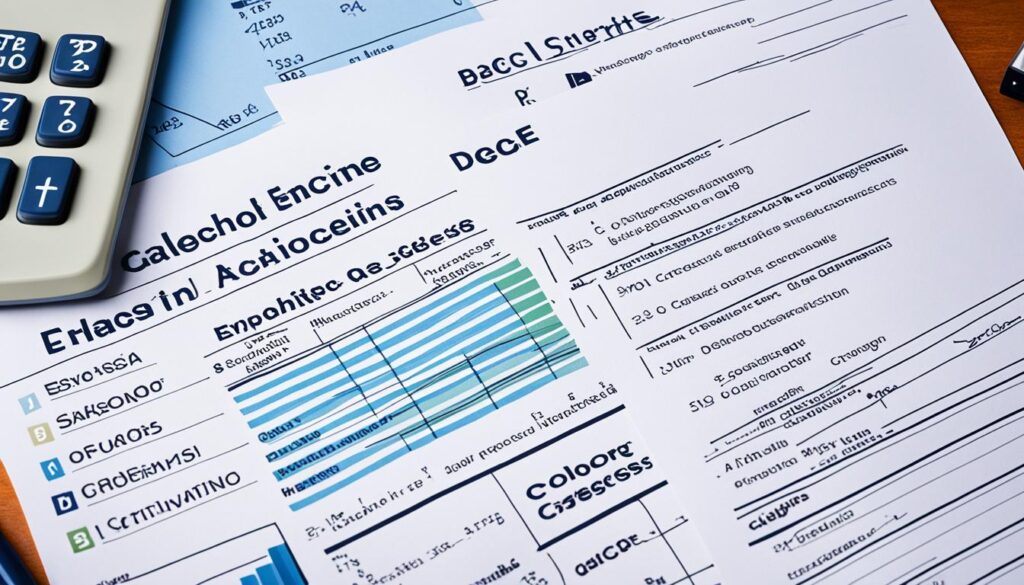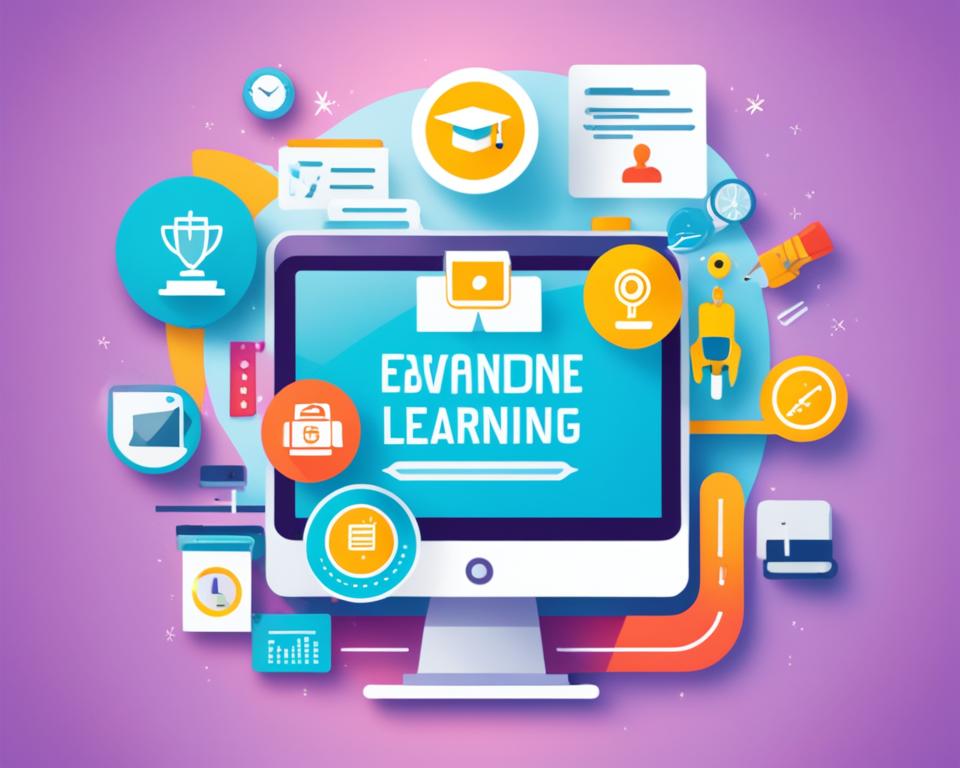Earning an online accounting degree provides a springboard to a profitable and challenging business career. The Bureau of Labor Statistics reported a median annual salary of $73,560 for accountants and auditors in 2020. Online accounting degrees offer flexibility, affordability, and accredited programs that are highly beneficial in today’s competitive job market.
Key Takeaways
- Earning an online accounting degree offers flexibility and convenience.
- The field of accounting offers a lucrative career path with high earning potential.
- Online accounting programs provide accredited and affordable education.
- An online accounting degree opens doors to various accounting roles and opportunities.
- Choosing a reputable online accounting school is essential for success in the field.
Benefits of Earning an Online Accounting Degree
Earning an online accounting degree offers several benefits. Online programs provide flexibility with asynchronous courses, allowing you to study at your own pace. Whether you’re a working professional or a busy parent, the flexibility of online education allows you to balance your studies with other commitments.
Another advantage of online accounting degrees is that they provide a flexible and adaptable education. The skills you acquire in these programs are transferable and can be applied across various industries. For example, strong analytical and problem-solving skills are highly sought after in today’s business landscape.
Moreover, online accounting programs often come with affordable tuition fees compared to traditional on-campus options. By choosing online education, you can save on commuting costs, housing expenses, and other related expenses. This makes it a cost-effective choice for those looking to advance their careers without breaking the bank.
“Earning an online accounting degree offers flexibility, transferable skills, and affordability.”
| Benefits | Online Accounting Degrees |
|---|---|
| Flexibility | Asynchronous courses allow you to study at your own pace. |
| Transferable Skills | Skills acquired can be applied to various industries. |
| Affordability | Tuition fees are often more affordable compared to traditional on-campus options. |
With the flexibility, transferable skills, and affordability that online accounting degrees offer, you can embark on a rewarding career in the field. Whether you aspire to become a certified public accountant or pursue other accounting roles, an online degree can provide you with the necessary foundation for success.
What Is Accounting?
Accounting is an essential discipline that has a long and fascinating history. Its roots can be traced back to ancient civilizations in Mesopotamia, where early accounting methods were developed to record and track economic transactions. Over the centuries, accounting has evolved and transformed into a structured and complex process that is crucial for the financial management of individuals and organizations.
In today’s modern world, accountants play a vital role in helping businesses, governments, and individuals make informed financial decisions. They utilize various tools and techniques, with one of the primary tools being ledgers. These ledgers serve as the foundation for recording, summarizing, and storing financial data, ensuring accuracy and accountability.
Accounting encompasses a wide range of roles and responsibilities. Accountants are involved in cost planning, helping businesses manage their expenses, analyze budgets, and make strategic financial decisions. They also ensure compliance with financial regulations and standards, both within organizations and in adherence to legal requirements.
Furthermore, accountants provide valuable financial advising services, guiding individuals and businesses in achieving their financial goals. Their expertise is instrumental in areas such as tax planning, investment analysis, and risk management. Accountants also contribute to executive decision-making, offering financial insights and projections that directly impact the success and growth of organizations.
Through the application of ancient accounting methods and the adoption of modern accounting processes, accountants continue to facilitate economic stability and drive business success in the contemporary world.
The Evolution of Accounting
- Early accounting methods: In ancient times, accounting primarily focused on record-keeping and tracking transactions. Various systems, such as clay tablets and papyrus scrolls, were used to record financial information.
- Double-entry bookkeeping: The double-entry bookkeeping system, developed in the 15th century by Luca Pacioli, revolutionized accounting. It introduced the concept of debits and credits, ensuring accurate and balanced financial records.
- Technological advancements: With the advent of computers and accounting software, manual bookkeeping processes have been automated, increasing efficiency, accuracy, and speed in financial reporting.
- International accounting standards: The establishment of international accounting standards, such as the Generally Accepted Accounting Principles (GAAP) and the International Financial Reporting Standards (IFRS), ensures consistency and comparability in financial statements across different countries and jurisdictions.
With the continuous development and advancement of accounting practices, the field remains dynamic and relevant in today’s ever-changing business landscape.
Why Get a Bachelor’s Degree in Accounting?
Holding a bachelor’s degree in accounting offers many advantages. According to the Bureau of Labor Statistics (BLS), professionals in accounting-related roles with a bachelor’s degree have a high earning potential, with median annual salaries exceeding $80,000.[1] But that’s not all—a bachelor’s degree in accounting also opens doors to various career opportunities and provides a strong foundation for professional growth.
One of the key benefits of obtaining a bachelor’s degree in accounting is the eligibility to sit for the certified public accountant (CPA) exam. Becoming a CPA is a prestigious achievement within the field, showcasing your expertise and boosting your credibility as an accounting professional. Passing the CPA exam can lead to even greater career prospects and higher earning potential.

| Advantages of a Bachelor’s Degree in Accounting |
|---|
| 1. High earning potential |
| 2. Eligibility for the CPA exam |
| 3. Enhanced career opportunities |
| 4. Strong foundation for professional growth |
Moreover, pursuing an online accounting degree offers additional financial and credit incentives. Online programs often provide flexible scheduling options, allowing you to balance your studies with other commitments. They also eliminate the need for commuting or relocating, saving you time and money. Additionally, many online accounting degree programs offer various scholarships, grants, and financial aid opportunities to support your educational journey.
Embarking on a bachelor’s degree in accounting sets you on a path towards a rewarding and lucrative career. Whether you aspire to work in public accounting, corporate finance, or financial consulting, a solid educational foundation is essential in achieving your goals.
Reference:
[1] Bureau of Labor Statistics. Occupational Outlook Handbook: Accountants and Auditors. Available at: https://www.bls.gov/ooh/business-and-financial/accountants-and-auditors.htm
Recommended Schools for an Accounting Degree
When it comes to pursuing an accounting degree, choosing the right school is crucial for your future career success. Consider factors such as accreditation, faculty expertise, and program offerings to make an informed decision. To help you in your search, here are some recommended online accounting schools that stand out for their exceptional education in accounting:
-
University of Southern California (USC)
A widely recognized institution, USC offers a top-notch online accounting program. The USC Leventhal School of Accounting provides students with a comprehensive curriculum and access to experienced faculty members. Graduates from this program have a high success rate in securing lucrative accounting positions.
-
Penn State World Campus
Penn State World Campus is the online learning platform of Pennsylvania State University. Their online accounting program offers flexibility and a rigorous curriculum. Students gain a solid foundation in accounting principles and can choose from various specialized courses to tailor their education to their career goals.
-
University of Texas at Dallas (UTD)
The online accounting program at UTD provides students with the knowledge and skills needed to excel in the accounting field. The Naveen Jindal School of Management offers a wide range of accounting courses and emphasizes a practical approach to learning. Graduates are well-prepared for the CPA exam and have a competitive edge in the job market.
These recommended online accounting schools offer high-quality education and comprehensive programs to help you succeed in your accounting career. Explore their websites to learn more about the specific courses, admission requirements, and resources they offer to support your academic journey.
Testimonials
“I chose the online accounting program at USC because of its prestigious reputation and the support they provide to students. The faculty members are experts in the field and are always available for guidance. The program not only helped me gain a solid foundation in accounting but also provided networking opportunities that opened doors for internships and job offers.”
– Sarah Thompson, USC Accounting Graduate
“Penn State World Campus provided me with the flexibility I needed to pursue my passion for accounting while working full-time. The program is well-structured, and the professors are highly knowledgeable. The online resources and virtual career fairs helped me connect with potential employers, and I secured a great job right after graduation.”
– Michael Stevens, Penn State World Campus Accounting Alumnus
“UTD’s online accounting program exceeded my expectations. The curriculum is rigorous and covers all essential accounting concepts. The professors have practical experience in the field and shared valuable insights that prepared me for real-world challenges. I highly recommend UTD to anyone looking to pursue a career in accounting.”
– Jennifer Rodriguez, UTD Online Accounting Student
Choosing one of these top online accounting schools can provide you with the knowledge, skills, and professional network necessary for success in the field of accounting.
What to Expect From Online Accounting Programs
Online accounting programs offer a comprehensive curriculum designed to equip you with the knowledge and skills necessary for a successful career in accounting. Whether you are just starting your academic journey or looking to advance in the field, these programs provide a flexible and convenient way to pursue your education. Here’s an overview of what you can expect from online accounting programs:
Course Requirements
Online accounting programs typically include a combination of core courses and specialized electives. Core courses cover fundamental topics such as accounting principles, financial reporting, and taxation. These courses lay the foundation for your accounting knowledge and provide a solid understanding of the industry’s best practices.
Specialized electives allow you to tailor your education to your specific interests and career goals. Whether you want to specialize in financial management, cost accounting, or another area, online programs offer a range of elective courses to choose from.
Below is an example of a typical course structure for an online accounting program:
| Course Type | Examples of Courses |
|---|---|
| Core Courses |
|
| Specialized Electives |
|
Specialization Options
Online accounting programs offer a variety of specialization options to help you develop expertise in a specific area. These specializations can enhance your career prospects and set you apart in the job market. Some popular specialization options in online accounting programs include:
- Fiduciary Accounting
- Securities Fraud
- Environmental Accounting
- Crypto Mining Accounting
- Actuarial Science
By choosing a specialization, you can delve deeper into a particular aspect of accounting that interests you and aligns with your career aspirations.
Minimal On-Campus Presence
While online accounting programs offer the flexibility of remote learning, some programs may require minimal on-campus presence for events or internships. These opportunities provide hands-on experience and networking opportunities that can greatly benefit your career development. It’s important to research the specific requirements of each program to ensure they align with your preferences and availability.
Overall, online accounting programs offer a comprehensive education that prepares you for the dynamic and evolving field of accounting. With a strong foundation in core accounting principles and the flexibility to specialize in your areas of interest, you can graduate ready to pursue a rewarding career in accounting.
Admission Requirements for Online Accounting Programs
Before embarking on your journey to earning an online accounting degree, it’s essential to understand the admission requirements and application process. Meeting these requirements is crucial for successfully entering an online accounting program.
- Education: To enroll in an online accounting program, you typically need a high school diploma or GED certificate. This foundational credential demonstrates your readiness for higher education.
- GPA and Standardized Tests: Some programs may have specific requirements regarding your Grade Point Average (GPA) and standardized test scores. These criteria ensure that applicants possess the necessary academic aptitude for success in the program.
- Application Process: Applying to an online accounting program usually involves the following steps:
- Online Application: Start by submitting an online application through the school’s website. This application serves as your first official step into the program.
- Official Transcripts: You will need to provide your official high school (or GED) transcripts. These documents validate your educational background and academic achievements.
- Recommendation Letters: Some programs may require recommendation letters from teachers, counselors, or employers. These letters vouch for your character, work ethic, and potential for success in an online accounting program.
- Essays: Prepare well-thought-out essays that discuss your interest in accounting, career aspirations, and how the program aligns with your goals. These essays showcase your written communication skills and commitment to the field.
By adhering to these admission requirements and completing the application process diligently, you increase your chances of securing a spot in an online accounting program that will set you on the path to a successful accounting career.
Concentration Options in Online Accounting Programs
Online accounting degree programs offer a wide range of concentration options that allow you to tailor your studies to match your interests and career goals. These specialized areas of focus provide you with in-depth knowledge and skills in specific areas of accounting.
Fiduciary Accounting
Fiduciary accounting is a specialization that focuses on managing and overseeing the financial affairs of trusts, estates, and other fiduciary entities. This concentration equips you with the expertise to navigate the complex regulations and reporting requirements involved in fiduciary transactions.
Securities Fraud
The securities fraud concentration delves into the detection, prevention, and investigation of fraudulent activities in the securities market. This specialization prepares you to identify and analyze fraudulent schemes and helps develop the skills necessary to work in regulatory agencies or financial institutions.
Environmental Accounting
Environmental accounting is a crucial field that addresses the financial impact and sustainability of various environmental initiatives. This concentration explores topics such as carbon accounting, sustainability reporting, and environmental risk management to prepare you for careers in organizations focused on environmental conservation and compliance.
Crypto Mining Accounting
Crypto mining accounting specialization focuses on the unique accounting principles and practices associated with cryptocurrency mining operations. With the increasing prominence of cryptocurrencies, this concentration provides the knowledge and skills needed to navigate the accounting challenges of this emerging industry.
Actuarial Science
Actuarial science is a specialized field that combines mathematical and statistical methods to assess and manage financial risks. This concentration prepares you for a career as an actuary, where you will analyze data, calculate risk probabilities, and help organizations make informed decisions regarding insurance, investments, and pensions.
By selecting a concentration in your online accounting program, you can develop expertise in a particular area of interest, distinguishing yourself in the job market and expanding your career opportunities.

Popular Accounting Courses
When pursuing an accounting degree, you will encounter a variety of courses that provide a comprehensive understanding of the field. These courses encompass the core accounting classes, electives, and a capstone project that allows you to apply your knowledge to real-world financial scenarios.
Core Accounting Classes
The core accounting classes form the foundation of your accounting education. These courses delve into essential topics and concepts required for a successful accounting career:
- Federal Taxation: Explore the intricacies of tax laws and regulations, gaining expertise in both personal and business taxation.
- Financial Statement Analysis: Learn how to analyze and interpret financial statements to evaluate a company’s performance, liquidity, and solvency.
- Auditing: Develop skills in assessing and examining financial records to ensure accuracy, compliance, and internal control.
Electives
In addition to the core courses, accounting programs offer a range of elective options that allow you to specialize in specific areas of interest. These elective courses provide a deeper understanding of specialized accounting topics:
- Sports Accounting: Explore the unique financial aspects of the sports industry, including athlete contracts, endorsement deals, and team finances.
- Assurance Services: Gain knowledge in providing assurance and consulting services related to financial reporting and operational processes.
- Environmental Accounting: Study the environmental impact of business activities and learn how to integrate sustainability principles into financial decision-making.
Capstone Project
A capstone project is often a requirement in accounting programs. This culminating project allows you to apply the knowledge and skills acquired throughout your studies to real-world financial challenges. Working on a capstone project provides hands-on experience and demonstrates your ability to analyze complex accounting issues and propose practical solutions.
| Course | Description |
|---|---|
| Federal Taxation | Explore the intricacies of tax laws and regulations, gaining expertise in both personal and business taxation. |
| Financial Statement Analysis | Learn how to analyze and interpret financial statements to evaluate a company’s performance, liquidity, and solvency. |
| Auditing | Develop skills in assessing and examining financial records to ensure accuracy, compliance, and internal control. |
| Sports Accounting | Explore the unique financial aspects of the sports industry, including athlete contracts, endorsement deals, and team finances. |
| Assurance Services | Gain knowledge in providing assurance and consulting services related to financial reporting and operational processes. |
| Environmental Accounting | Study the environmental impact of business activities and learn how to integrate sustainability principles into financial decision-making. |
The combination of core accounting classes, specialized electives, and a hands-on capstone project equips you with the necessary knowledge and skills for a successful accounting career.
How Much Does an Online Accounting Degree Cost?
When considering pursuing an online accounting degree, one of the important factors to consider is the cost. The cost of an online accounting degree can vary depending on the school and program you choose. However, many public colleges and universities offer in-state tuition rates to distance learners, making online education more affordable and accessible.
According to the National Center for Education Statistics, the average in-state tuition and fees for public schools during the 2018-2019 academic year were $9,212. This is a significant cost savings compared to out-of-state tuition rates or attending private institutions.
It’s also essential to consider other expenses beyond tuition and fees. These expenses may include:
- Room and board: The cost of housing and meals if you decide to live on campus or rent an apartment near the school.
- Commuting: If you choose to commute to campus, factor in the cost of transportation.
- Textbooks: Textbooks and course materials can add up, so it’s important to budget for these expenses.
- Technology: Online accounting programs may require specific software or hardware, so make sure to include any technology-related expenses.
Financial aid options are also available to help students manage the cost of their education. Scholarships, grants, and student loans can provide valuable assistance to offset tuition expenses. It’s essential to explore these options and determine your eligibility for financial aid.
By understanding the cost and financial considerations associated with an online accounting degree, you can make an informed decision that aligns with your budget and career goals.
| School | In-State Tuition and Fees | Out-of-State Tuition and Fees |
|---|---|---|
| University of California, Berkeley | $14,184 | $44,974 |
| University of Texas at Austin | $11,448 | $38,228 |
| University of Illinois at Urbana-Champaign | $15,094 | $32,264 |
| University of Florida | $6,380 | $28,658 |
| Pennsylvania State University | $18,450 | $34,858 |
Average Tuition and Fees for Online Accounting Programs
The table above shows a comparison of average tuition and fees for online accounting programs at select universities. These figures are meant to provide a general idea of the cost differences between in-state and out-of-state tuition options. It’s important to note that tuition and fees can vary widely depending on the school, program, and residency status. Before making a decision, it’s recommended to research specific institutions and their respective costs.
Choosing the Right Online Accounting Program
When it comes to pursuing an online accounting degree, selecting the right program is essential to your success. With numerous options available, it’s important to thoroughly research and consider various factors that align with your educational and career goals. By carefully evaluating program rankings, accreditation, faculty expertise, curriculum flexibility, and student support services, you can make an informed decision that sets you on the path to a successful accounting career.
Program Rankings
Program rankings provide valuable insights into the quality and reputation of online accounting programs. These rankings are often published by reputable educational organizations and industry publications, and they assess factors such as curriculum quality, faculty reputation, student satisfaction, and graduate outcomes. By referring to program rankings, you can gauge the strengths and weaknesses of different online accounting programs, helping you make a well-informed choice.
Accreditation
Accreditation is an important factor to consider when choosing an online accounting program. Accredited programs meet specific educational standards set by accrediting bodies, ensuring the quality and rigor of the curriculum. Employers often value degrees from accredited institutions, as they demonstrate a commitment to excellence in accounting education. Look for programs that are accredited by recognized accrediting bodies such as the Association to Advance Collegiate Schools of Business (AACSB) or the Accreditation Council for Business Schools and Programs (ACBSP).
Faculty Expertise
The expertise and qualifications of the faculty members can greatly impact your learning experience when pursuing an online accounting degree. Look for programs that have faculty with relevant industry experience, advanced degrees in accounting, and certifications such as Certified Public Accountant (CPA) or Chartered Financial Analyst (CFA). Faculty members who have practical experience can provide valuable insights and real-world examples that enhance your understanding of complex accounting concepts.
Curriculum Flexibility
The flexibility of the curriculum is an important consideration, especially if you have other commitments such as work or family responsibilities. Look for programs that offer flexible course schedules, allowing you to complete coursework at your own pace. Additionally, consider the availability of specialized courses or concentrations that align with your specific areas of interest within the field of accounting.
Student Support Services
Support services play a crucial role in your online learning journey. Look for programs that offer comprehensive student support services, such as academic advising, career counseling, access to online library resources, and technical support. These services can greatly enhance your overall learning experience and help you stay motivated and engaged throughout the program.
By carefully considering these factors, you can choose the right online accounting program that aligns with your career goals and provides you with the knowledge and skills necessary for success in the field of accounting.
Conclusion
Earning an online accounting degree is a smart choice for those seeking a successful career in the field. With the convenience and flexibility of online education, you can gain the knowledge and skills needed to excel in various accounting roles. These programs offer specialized courses and expert faculty guidance to prepare you for the dynamic world of finance.
One of the key advantages of online accounting education is the flexibility it offers. You can study at your own pace, balancing your coursework with other commitments. This flexibility enables you to pursue your education while working or fulfilling other personal responsibilities, making it accessible to a wider range of individuals.
Moreover, an online accounting degree is a cost-effective option compared to traditional on-campus programs. Through accredited online schools, you can access high-quality education at a fraction of the cost. This affordability allows you to invest in your education without incurring substantial debt, setting you up for a secure financial future.
The demand for accountants is projected to increase in the years to come, providing a wealth of career opportunities. With an online accounting degree, you can embark on a rewarding and fulfilling career path, contributing to the financial success of businesses and individuals. Don’t miss out on the professional growth and advancement prospects that come with earning an online accounting degree.
FAQ
What are the benefits of earning an online accounting degree?
Earning an online accounting degree offers flexibility, affordability, and accredited programs that are highly beneficial in today’s competitive job market.
What is accounting?
Accounting is the process of recording and storing financial transactions and data for individuals and organizations.
Why should I get a bachelor’s degree in accounting?
A bachelor’s degree in accounting provides high earning potential, credits to sit for the CPA exam, and financial and credit incentives.
Which schools are recommended for an accounting degree?
There are prestigious institutions that offer high-quality education in accounting, such as [School 1], [School 2], and [School 3].
What can I expect from online accounting programs?
Online accounting programs include introductory courses, specialized courses, and the option to choose from various concentration options.
What are the admission requirements for online accounting programs?
To enroll in an online accounting program, typically you need a high school diploma or GED certificate, and may need to submit additional materials such as transcripts, recommendation letters, and essays.
What concentration options are available in online accounting programs?
Online accounting degree programs offer various concentration options, such as fiduciary accounting, securities fraud, environmental accounting, crypto mining accounting, and actuarial science.
What are some popular accounting courses?
Popular accounting courses include federal taxation, financial statement analysis, auditing, and elective courses like sports accounting and environmental accounting.
How much does an online accounting degree cost?
The cost of an online accounting degree varies, but many public colleges offer in-state tuition rates to distance learners. Other expenses to consider include room and board, commuting, textbooks, and technology.
How do I choose the right online accounting program?
When selecting an online accounting program, it is important to consider factors such as accreditation, program rankings, faculty expertise, curriculum flexibility, and student support services.
What are the career opportunities with an online accounting degree?
Earning an online accounting degree provides a path to a successful career in various accounting roles, with ample opportunities for professional growth.





